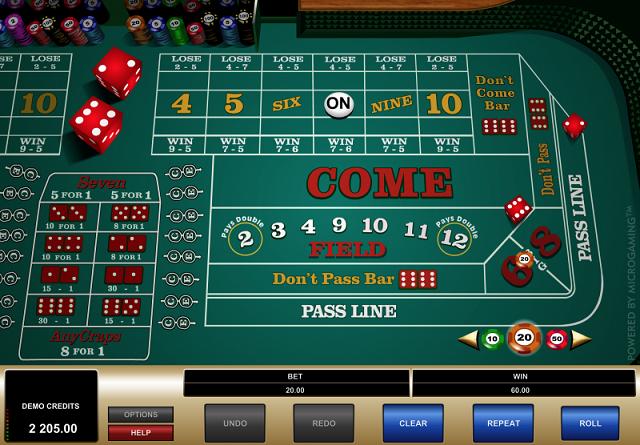How To Play Craps
It’s one of the most exciting games around, but many causal gamblers have no idea know how to play craps. The age-old dice game has been played worldwide for several centuries and counting.
Head out to explore any casino floor and you’ll invariably come across a packed craps table. The scene here is usually straight out of a Hollywood depiction of the gambling world.
Instead of the silent, robotic play you’ll find on the slot machines or blackjack tables, a craps game is almost always loud, boisterous, and tons of fun.
Don’t be surprised to see strangers high-fiving and hugging. The group celebration is part of what makes craps so popular. The communal spirit of camaraderie blossoms at the right table.
As popular as the game is, craps can have beginners learning the game swimming in slang terms and rigid rules. Recreational players report craps to be the most intimidating from the outside looking in.
On that note, if you’re looking to learn the game of craps quickly and easily, this page is for you. You’ll find a full primer on the basic rules and gameplay, followed by a strategy section designed to keep your bets behind the best wagers only.
From there, you’ll be prepared to take your spot at the next crowded craps table you happen to come across. By knowing how to play craps, you’ll be ready to win.

How Do You Play Craps?
Take one look at the craps table layout and you’ll immediately understand why novices can be scared off the game.
The felt is a veritable maze of numbers between 2 and 12, oddly shaped betting boxes, and cryptic commands like “Come” and “Don’t Come”. You’ll see areas labeled “Pass Line,” “Don’t Pass,” and “Field,” and even little dice graphics that spell out various combinations.
All in all, this is one of the busiest layouts in casino gaming, and unless you know your way around the table it’s quite easy to get lost.
But for beginners, the main area to focus on is the Pass Line and the Don’t Pass Line.
These are essentially ante bets in craps. You need to place a wager on either the Pass Line or Don’t Pass Line in order to have the dice handed over.
Both the Pass Line and the Don’t Pass Line are great bets in terms of the house edge, offering 1.41% and 1.36%, respectively. While that Don’t Pass Line wager is slightly better for the player, you won’t see many folks out there putting their bucks behind it.
What is Better: Betting on the Pass Line or the Don’t Pass Line?
Here’s why: when you bet on the Pass Line, you’re betting with the shooter – or the person assigned to roll the dice on that particular round.
Every round of craps begins with an initial roll, which is called the “come out” roll in craps lingo. When the shooter rolls a 7 or 11 total on the come out roll, Pass Line bettors win even money on their wager. Any 2, 3, or 12, on the other hand, causes Pass Line bettors to lose.
Conversely, those who bet on the Don’t Pass Line are hoping to see that 2, 3, or 12 arrive on the come out roll. They get an even-money payout when that happens, but lose on any 7 or 11.
Most players – whether they’re experts or newbies – choose to back the Pass Line with their first bet. There’s a mathematical justification for that, as you’ll learn in the next section, but it’s also a matter of common sense. If most players at the table are hoping to see the come out roll produce a favorable total, those odd Don’t Pass Line bettors are wagering against the crowd.
For this reason, backing the Don’t Pass Line is often referred to as “wrong way” or “dark side” betting among those that know how to play craps.
So let’s say you’ve plunked down a $5 chip on the Pass Line to get started… now what?
Well, that all depends on the result of the come out roll.
As you know by now, Pass Line bettors hope to see a 7 or 11 hit to score an immediate even-money payout. Fortunately for you, the 7 is the most likely combination to arrive whenever a pair of dice get tumbled – as you can see in the table below:
Probability of Hitting Any Two-Dice Totals
| Total | Combinations | Probability |
|---|---|---|
| 2 | 1 (1+1) | 2.78% |
| 3 | 2 (1+2, 2+1) | 5.56% |
| 4 | 3 (1+3, 2+2, 3+1) | 8.33% |
| 5 | 4 (1+4, 2+3, 3+2, 4+1) | 11.11% |
| 6 | 5 (1+5, 2+4, 3+3, 4+2, 5+1) | 13.89% |
| 7 | 6 (1+6, 2+5, 3+4, 4+3, 5+2, 6+1) | 16.67% |
| 8 | 5 (2+6, 3+5, 4+4, 5+3, 6+2) | 13.89% |
| 9 | 4 (3+6, 4+5, 5+4, 6+3) | 11.11% |
| 10 | 3 (4+6, 5+5, 6+4) | 8.3% |
| 11 | 2 (5+6, 6+5) | 5.56% |
| 12 | 1 (6+6) | 2.78% |
And if the come out roll drops a 2, 3, or 12 on the table, your Pass Line bet is toast straight away. Thankfully, as the table above shows, those numbers offer the worst chances of coming up.
But what about all the other numbers that can arrive on board? Good question.
What are Point Numbers?
Whenever the come-out roll produces a 4, 5, 6, 8, 9, or 10, this number becomes the “point.” You’ll see the dealer turn a big white button over to read “ON,” and that’ll get slid directly under the new point number’s space on the betting grid.
Point numbers are where craps really gets interesting.
After a point has been set, the shooter must continue to roll until either one of two scenarios occur. If they roll the point number again before landing a 7, all Pass Line bettors earn an even-money reward. And if a 7 shows up before the point number, this “seven out” ends the roll and causes almost all bets on the board to lose.
With a point now established – in the case of your example roll, the point will be 6 – Pass Line and Don’t Pass Line bettors alike have a full menu of wagering choices awaiting them.
At this point, Pass Line players have the option to place a secondary bet known as Odds. To make an Odds bet, you simply slide a chip (or stack of chips, up to the table limit) directly behind your Pass Line bet.
From there, you’re hoping to see the shooter hit that point number for a second time before finding a 7. If they do, you’ll be paid out according to the true odds against that happening, as shown below:
Odds Bet Payouts by Point Number
| Point | Payout |
|---|---|
| 4 or 10 | 2 to 1 |
| 5 or 9 | 3 to 2 |
| 6 or 8 | 6 to 5 |
You’ve got a 6-point number established, and $5 on the Pass Line – so what’s the play? In this spot, you can bet anywhere from $5 to the table limit on the Odds, and that limit is typically 5x your initial bet. After sliding out a stack of $25 on the Odds, you look expectantly at the shooter and hope to see another 6 arrive on board.
This time, however, the shooter rolls a 4 – so you lose that $25, right?
Nope, not in craps. You’ll only lose your Odds bet when the shooter sevens out. Any roll that doesn’t hit the point is simply neutral – for Pass Line and Odds bettors; other players may be backing exotic wagers that do involve the other numbers – meaning it doesn’t produce a win or a loss.
On the third roll, however, you see a sweet 4-2 combination land to hit the 6 point. Now, it’s time to celebrate like the craps regulars do. You’ve just earned a 6-to-5 payout on your $25 for the Odds, good for a whopping $30 return.
Oh, and your original $5 on the Pass Line turned a winner too, making it a cool $35 profit on the round.
Pass Line betting is the bread and butter for craps beginners, based both on its simplicity and a low house edge.
Understanding the Odds
As a basic Pass Line bettor at the craps table, you’ll be in a great position to enjoy a good time, all while facing extremely low house edges.
You can consult the table below to see how Pass Line and Odds betting – along with all of the exotics offered by craps – stack up in terms of house edge:
Bets by Payout and House Edge
| Bet | Pays | House Edge |
|---|---|---|
| Pass Line | 1 to 1 | 1.41% |
| Don’t Pass Line | 1 to 1 | 1.36% |
| Pass Odds | 2 to 1 (4 or 10) 3 to 2 (5 or 9) |
0% |
| Don’t Pass Odds | 1 to 2 (4 or 10) 2 to 3 (5 or 9) 5 to 6 (6 or 8) |
0% |
| Come | 1 to 1 | 1.41% |
| Don’t Come | 1 to 1 | 1.36% |
| Come Odds | 2 to 1 (4 or 10) 3 to 2 (5 or 9) 6 to 5 (6 or 8) |
0% |
| Don’t Come Odds | 1 to 2 (4 or 10) 2 to 3 (5 or 9) 5 to 6 (6 or 8) |
0% |
| Place Bets | 9 to 5 (4 or 10) 7 to 5 (5 or 9) 7 to 6 (6 or 8) |
6.7% 4% 1.5% |
| Buy Bets | 2 to 1 (4 or 10) 3 to 2 (5 or 9) 6 to 5 (6 or 8) |
4.76% |
| Lay Bets | 1 to 2 (4 or 10) 2 to 3 (5 or 9) 5 to 6 (6 or 8) |
2.44% 3.23% 4% |
| Big 6 or 8 | 1 to 1 | 9.09% |
| Field Bets | 1 to 1 (3/4/9/10/11) 2 to 1 (2/12) |
5.56% |
| Hardways | 7 to 1 (4 or 10) 9 to 1 (6 or 8) |
11.1% 9.09% |
| Any 7 | 4 to 1 | 16.9% |
| Any Craps | 7 to 1 | 11.1% |
| Proposition 2 or 12 | 30 to 1 | 13.9% |
| Proposition 3 or 11 | 15 to 1 | 11.1% |
Can you Find a Really Low House Edge in Craps?
That’s no typo either, as the Odds bet really does offer a house edge of 0.00%. There is a catch, of course, as you must place a Pass Line bet first in order to bet the Odds, but between 1.41% and zip, using this conservative approach offers the best strategy for craps success.
Craps is much more complex than the Pass Line plus Odds approach, however, so be sure to brush up on exotic bets, expert plays, and advanced strategy when learning how to play craps.



